This article shines a light on how parent training in Applied Behavior Analysis (ABA) can truly empower caregivers in supporting their child's growth. By participating in tailored training programs and applying specific ABA techniques, parents can make a remarkable difference in their child's behavioral outcomes and overall development. When parents are actively involved in the therapeutic process, we often see wonderful improvements in social skills and communication.
Let’s explore this together! Engaging in these programs not only helps parents learn effective strategies but also fosters a deeper connection with their child. Imagine the joy of witnessing your child thrive as you navigate this journey hand-in-hand. We're here to help you every step of the way!
Navigating the world of Applied Behavior Analysis (ABA) therapy can feel overwhelming for many families. It's not always easy to understand how to effectively support a child's unique needs. In this article, we’ll explore ten practical parent training ABA examples that not only empower caregivers but also enhance the developmental journey of children.
As parents engage more in their child's therapy, they often encounter challenges that can seem daunting. How can they effectively implement these strategies at home? By diving into real-life examples and the transformative impact of parent involvement, you’ll discover the keys to fostering a supportive environment that promotes growth and positive behavior change.
Let’s explore this together!
At Rori Care - ABA Therapy, we understand the challenges families face when navigating Applied Behavior Analysis treatment. That’s why we offer tailored programs designed to guide you through this journey with compassion and care. Our focus is on equipping caregivers with the skills and knowledge they need to support their child’s unique needs by providing parent training ABA examples.
By actively involving you in the parent training ABA examples, we ensure that you are not just a spectator but an essential part of your child's development. This collaborative approach creates a nurturing atmosphere that really enhances the effectiveness of ABA therapy, as seen in various parent training ABA examples. In fact, when caregivers are engaged, about 90% of kids show improvement in important behavioral areas!
We also prioritize individualized behavior intervention plans, incorporating parent training ABA examples, crafted by our qualified analysts. This means you can expect positive behavior changes and skill acquisition, all while we emphasize the importance of caregiver education. And don’t worry—insurance coverage options are available to help you access these vital services.
With consistent support at home, you’ll see improved outcomes for your little ones. Let’s explore this journey together, and remember, we’re here to help you every step of the way!
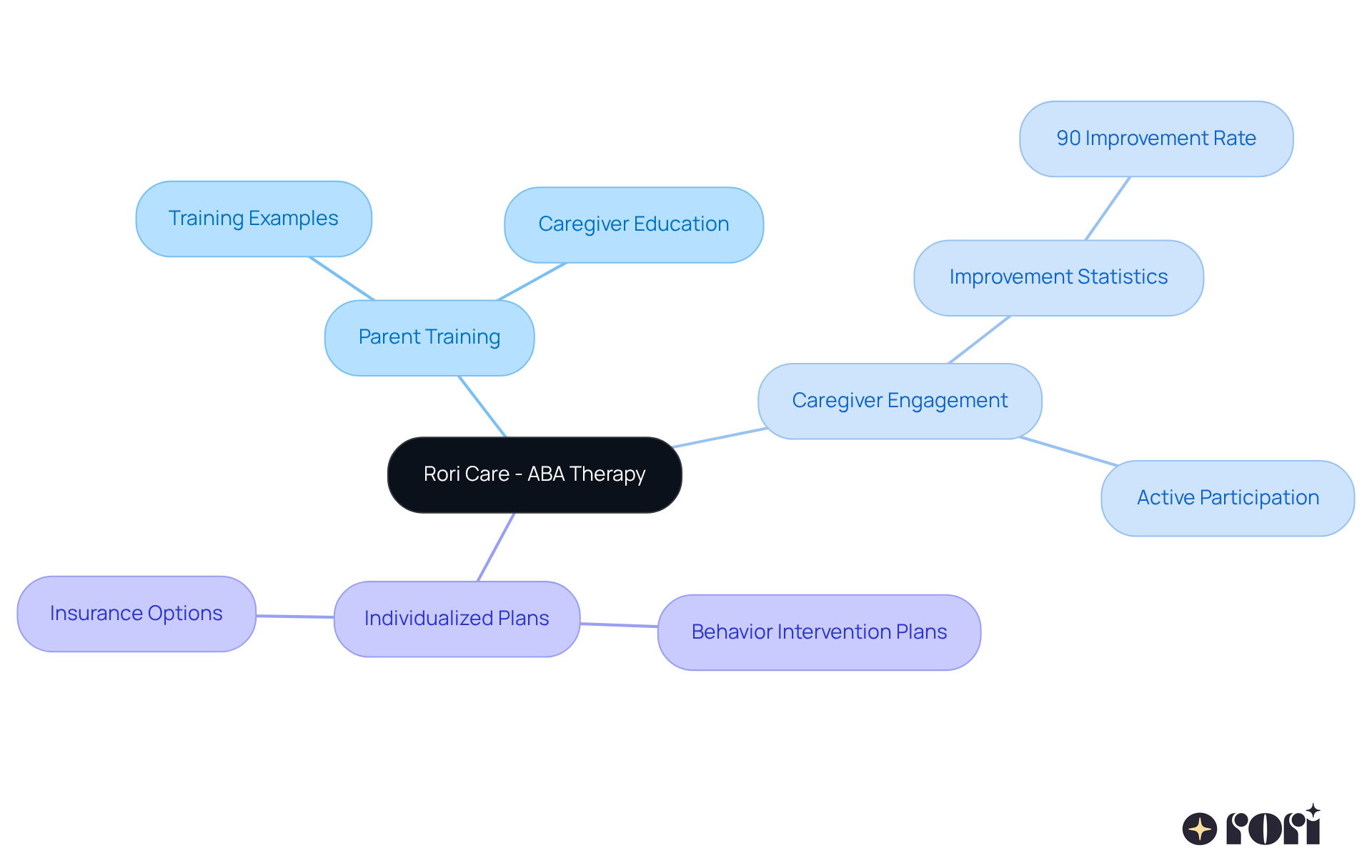
Positive reinforcement techniques are truly essential in ABA therapy! They encourage those desired behaviors through rewards and praise, making a real difference at home. For instance, when your little one finishes a task or shows positive behavior, offering verbal praise, stickers, or small rewards can work wonders. This not only motivates them but also strengthens the behavior, increasing the chances of it happening again.
By actively engaging in parent training ABA examples, you can significantly influence your child's growth and development. It’s all about creating that positive atmosphere together! So, let’s explore this journey of encouragement and support together. We’re here to help you every step of the way!
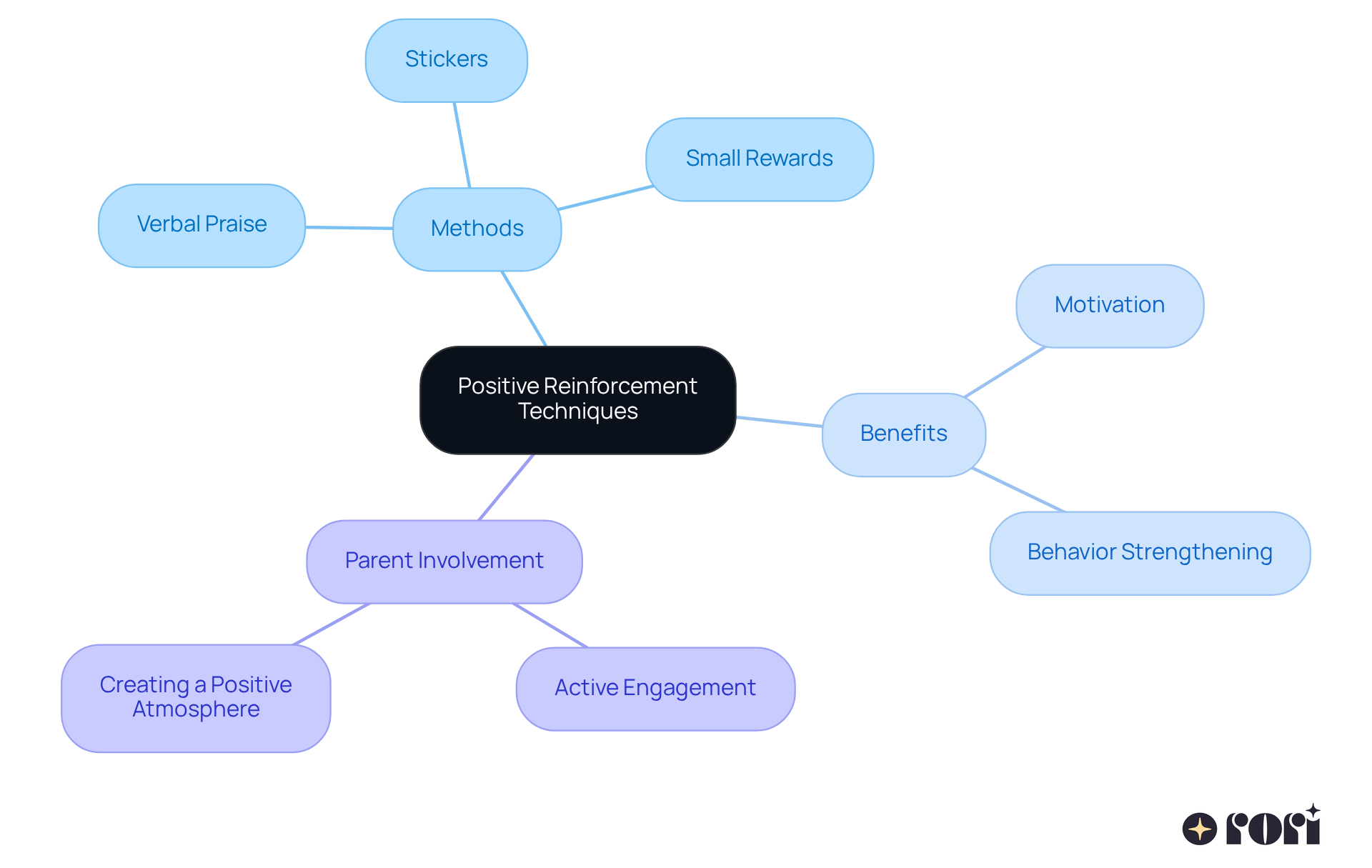
A cooperative strategy that includes parent training ABA examples along with caregivers and professionals is key to making ABA therapy effective. By fostering open dialogue and consistent feedback, parents can share valuable insights about their child's behavior and progress through parent training ABA examples. In turn, professionals can provide guidance and support tailored to those needs. This teamwork helps create a treatment plan that includes parent training ABA examples, ensuring it truly aligns with the young person's needs and family dynamics.
Regular gatherings and briefings ensure everyone is on the same page, leading to more efficient interventions and better outcomes for the individual. At Rori Care, we use automatic data collection during sessions. This means our clinical team can keep an eye on progress without interrupting therapy. Plus, the data is securely stored, anonymized, and deleted after analysis—empowering caregivers to make informed decisions.
To further support your child's development, we encourage you to actively engage in discussions about the data collected and how it shapes treatment strategies. Let’s explore this together! Your involvement makes a difference, and we’re here to support you with parent training ABA examples every step of the way!
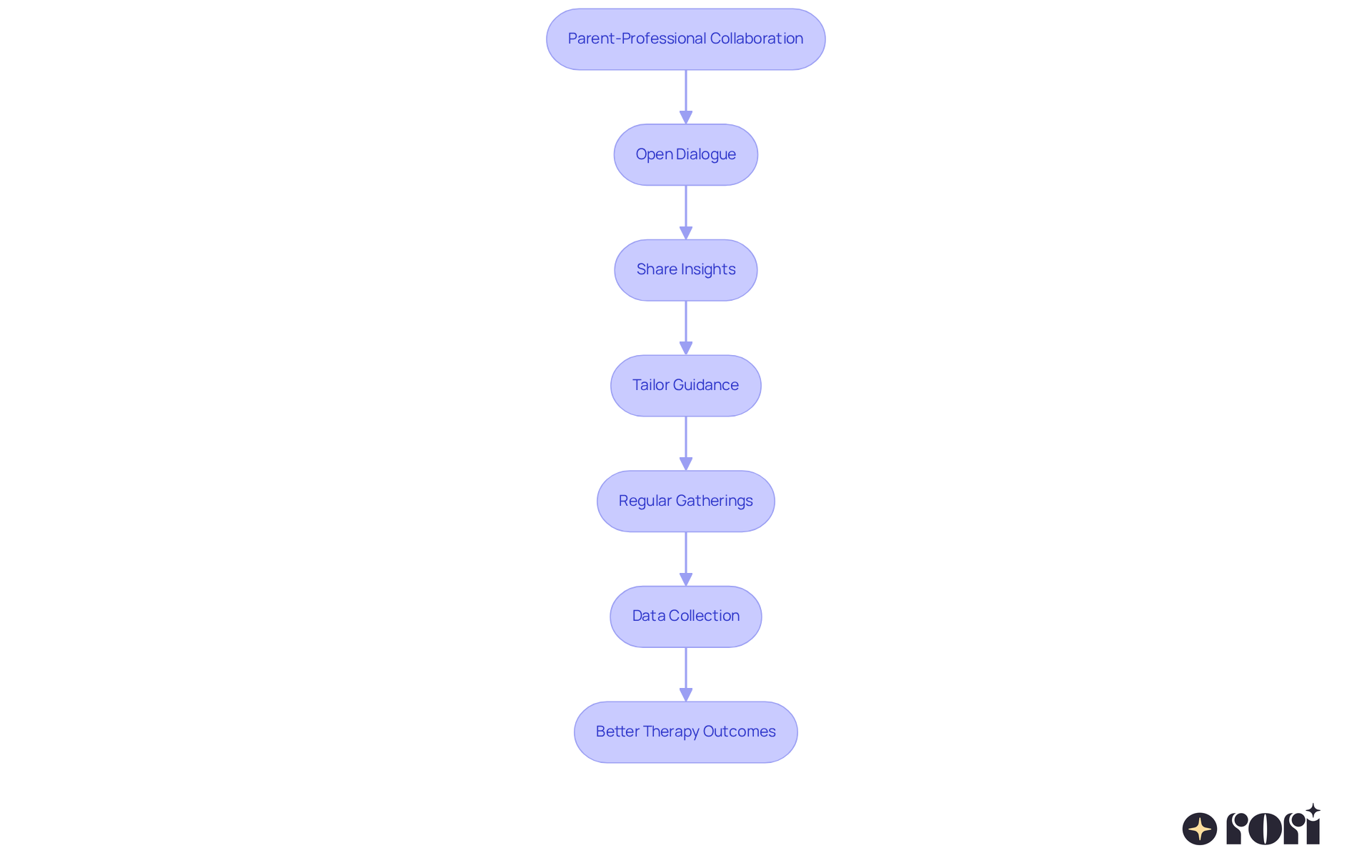
One notable case study involved a young individual who faced challenges with social interactions and communication. Through a parent-led ABA intervention, the mother applied strategies from parent training ABA examples she learned during training sessions. This included modeling appropriate social behaviors and using visual aids. By doing so, she was able to make informed choices that positively influenced her child’s progress.
Over time, the young one showed remarkable advancements in starting conversations and interacting with peers. This case beautifully illustrates how empowered parents, equipped with ABA principles and strategies, can lead to transformative outcomes, which are evident in parent training ABA examples. It reinforces the idea that active involvement in ABA therapy is crucial for success.
Let’s explore this together! Your journey can be filled with similar successes, and we’re here to help you every step of the way!
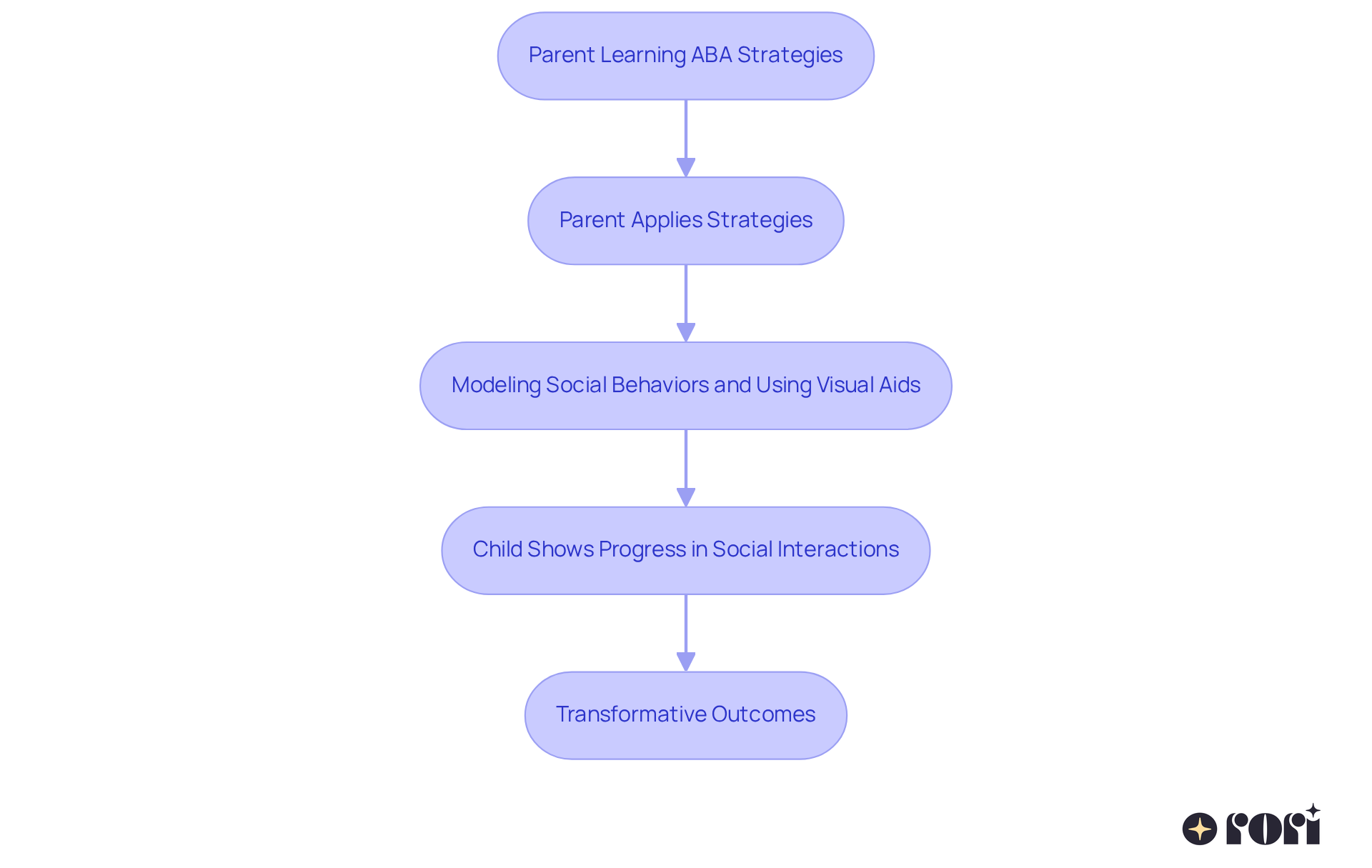
Integrating ABA strategies into daily routines is so important for reinforcing learning and promoting consistent progress! Parents can easily incorporate techniques like visual schedules, token systems, and social stories into their everyday activities using parent training ABA examples. It’s all about tailoring each approach to fit your child’s unique needs and goals.
For example, using a visual schedule can really help a young person understand the order of daily tasks. This not only reduces anxiety but also encourages independence! By setting clear, measurable goals for behavior modification and skill enhancement, caregivers can keep track of their child’s progress and make any necessary adjustments along the way.
At Rori Care, our behavior analysts utilize evidence-based strategies grounded in the latest research, ensuring that the methods we use are effective for behavior change. By weaving these strategies into daily activities, caregivers create an organized environment that supports their child’s learning and growth, illustrating parent training ABA examples as a seamless part of their lives.
To enhance this integration even further, guardians can regularly evaluate and tweak their approaches based on their child’s progress. This way, you’re ensuring continuous support and development. Let’s explore this together! We’re here to help you every step of the way!
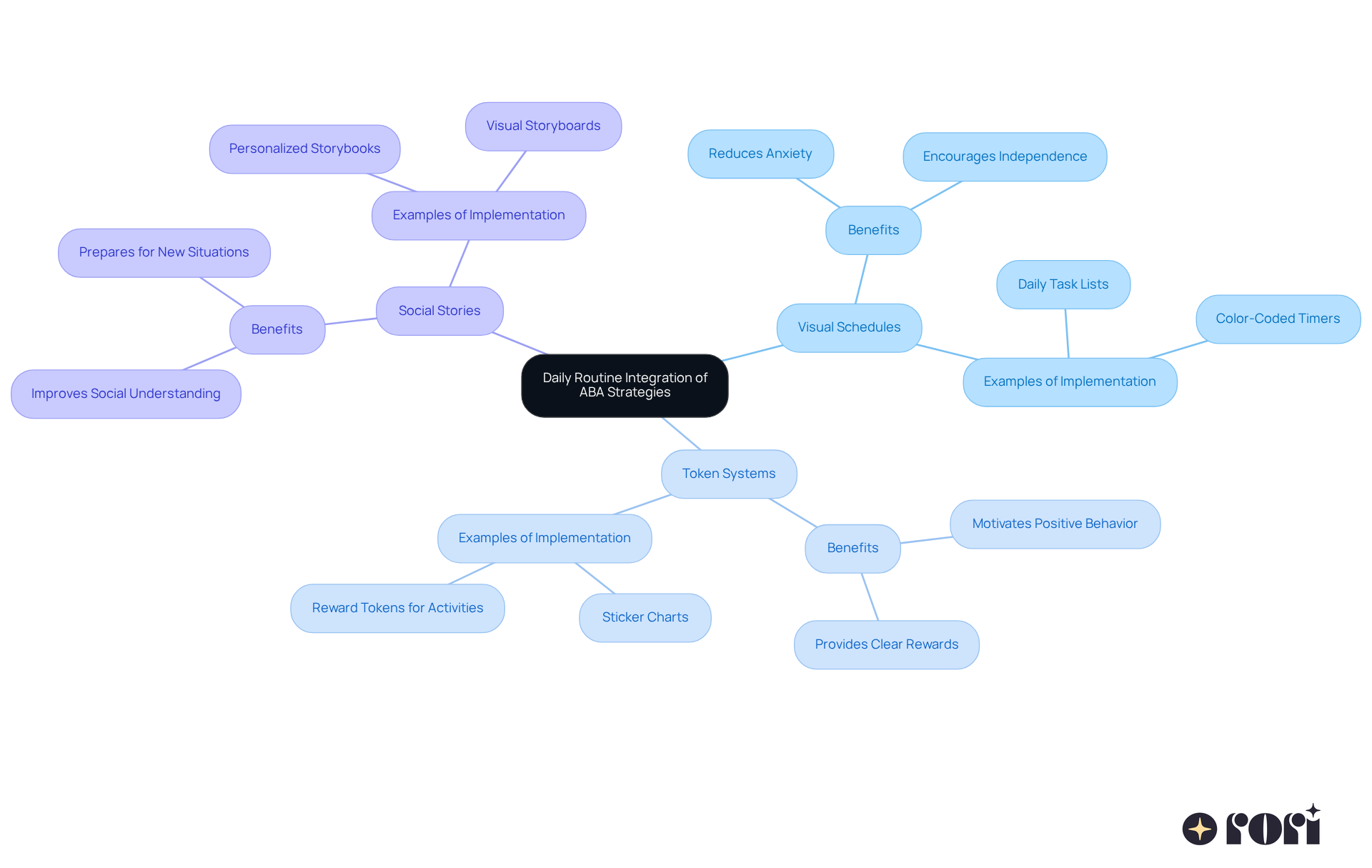
Parent training ABA examples can sometimes feel overwhelming. Time constraints, inconsistent application of strategies, and the challenge of understanding complex concepts are just a few hurdles parents might face. But don’t worry! By creating a consistent schedule for training sessions and setting achievable goals, you can make this journey a bit easier. And remember, seeking assistance from professionals when needed is always a smart move.
As you dive deeper into ABA principles and strategies, you’ll find that understanding them can empower you to make informed decisions that positively impact your child's progress. It’s all about taking one step at a time! Plus, connecting with resources like online forums or support groups can provide you with encouragement and shared experiences. This not only enhances your confidence but also helps reduce stress.
By proactively addressing these challenges and actively engaging in your child's therapy, utilizing parent training ABA examples, you can significantly improve behavioral outcomes and foster your child's development. Let’s explore this together! We’re here to help you every step of the way!
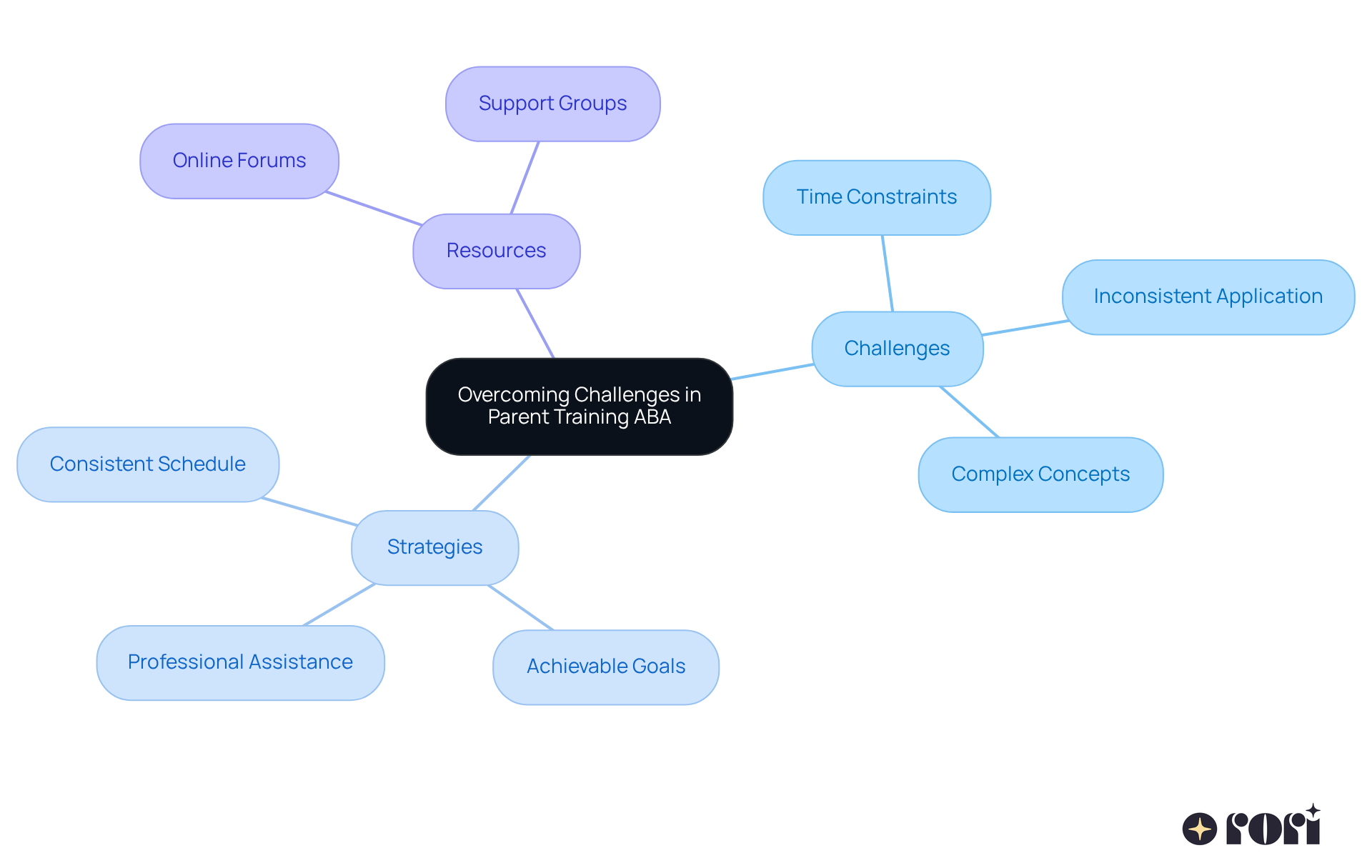
Technology truly makes a difference in enhancing ABA training for caregivers! Tools like mobile apps, online training modules, and video modeling provide accessible resources to boost your skills. For instance, apps that track behavior data can help you monitor progress and spot trends, while video modeling demonstrates effective techniques in real-time.
And let’s not forget about Rori Care! They’re using cutting-edge AI to automate the collection and analysis of behavioral data, making ABA therapy much more efficient. This automation simplifies reporting and frees up to 50% more time for the direct treatment of children. By embracing these innovative tools, you can elevate your training experience and ensure you’re equipped with the knowledge needed to support your child’s development effectively. Let’s explore this together!
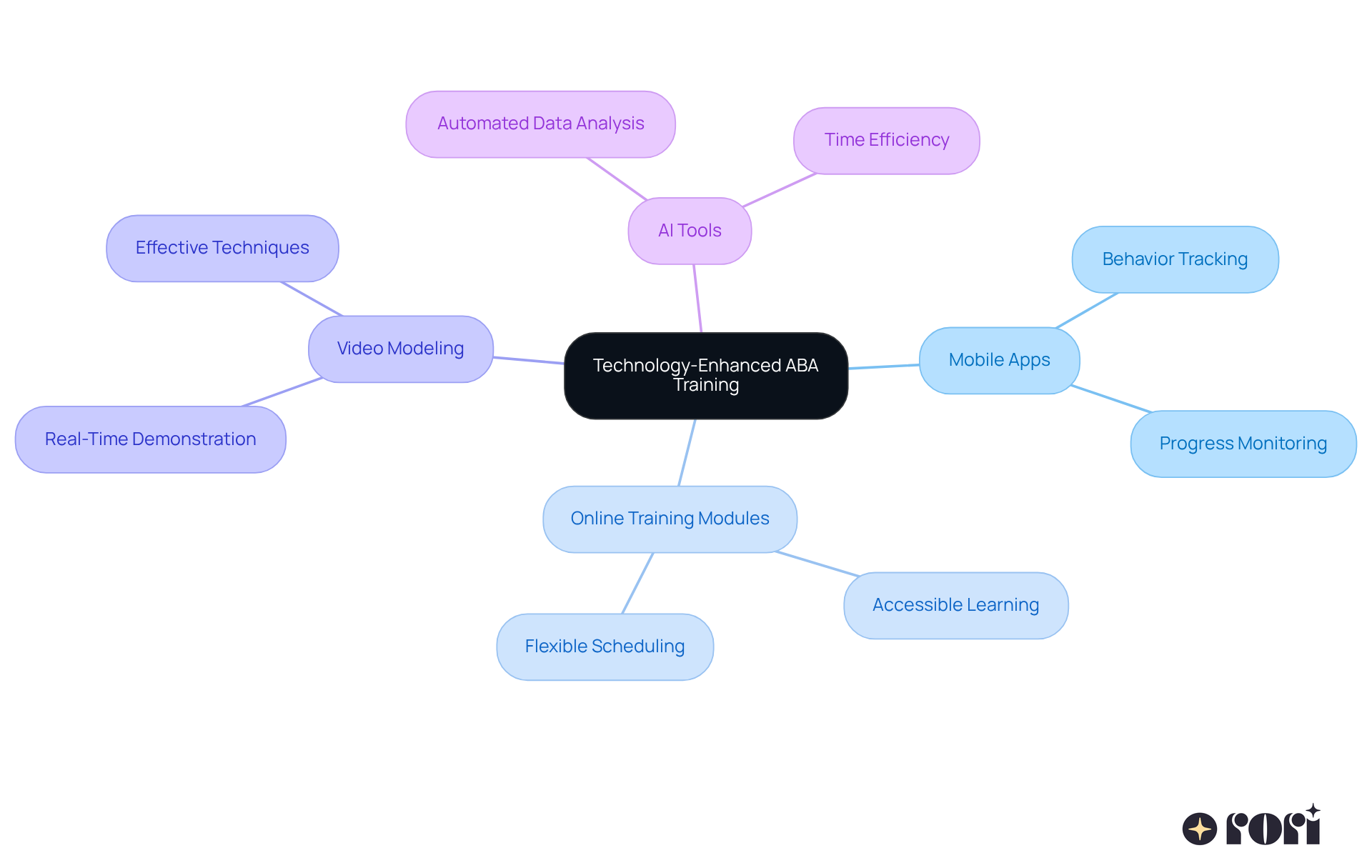
Examples of parent training in ABA therapy offer wonderful benefits that can truly impact your child's development. When you, as guardians, are actively involved in your child's therapy, you can help strengthen their learning, provide consistent support, and create a nurturing environment that encourages growth. By enhancing your understanding of ABA principles and strategies, you can make informed choices that positively influence your child's progress.
Research shows that kids whose parents are engaged in their therapy often show improved social skills, communication, and behavior. Plus, when you feel empowered as a caregiver, it boosts your confidence in supporting your child, which can reduce stress and improve family dynamics. To make the most of these advantages, it’s essential to work closely with therapists and utilize parent training ABA examples to align your home strategies with what’s being practiced in therapy sessions.
Investing in caregiver training not only lays a solid foundation for your child's success but also promotes their overall well-being. Let’s explore this journey together and see how we can support each other along the way!
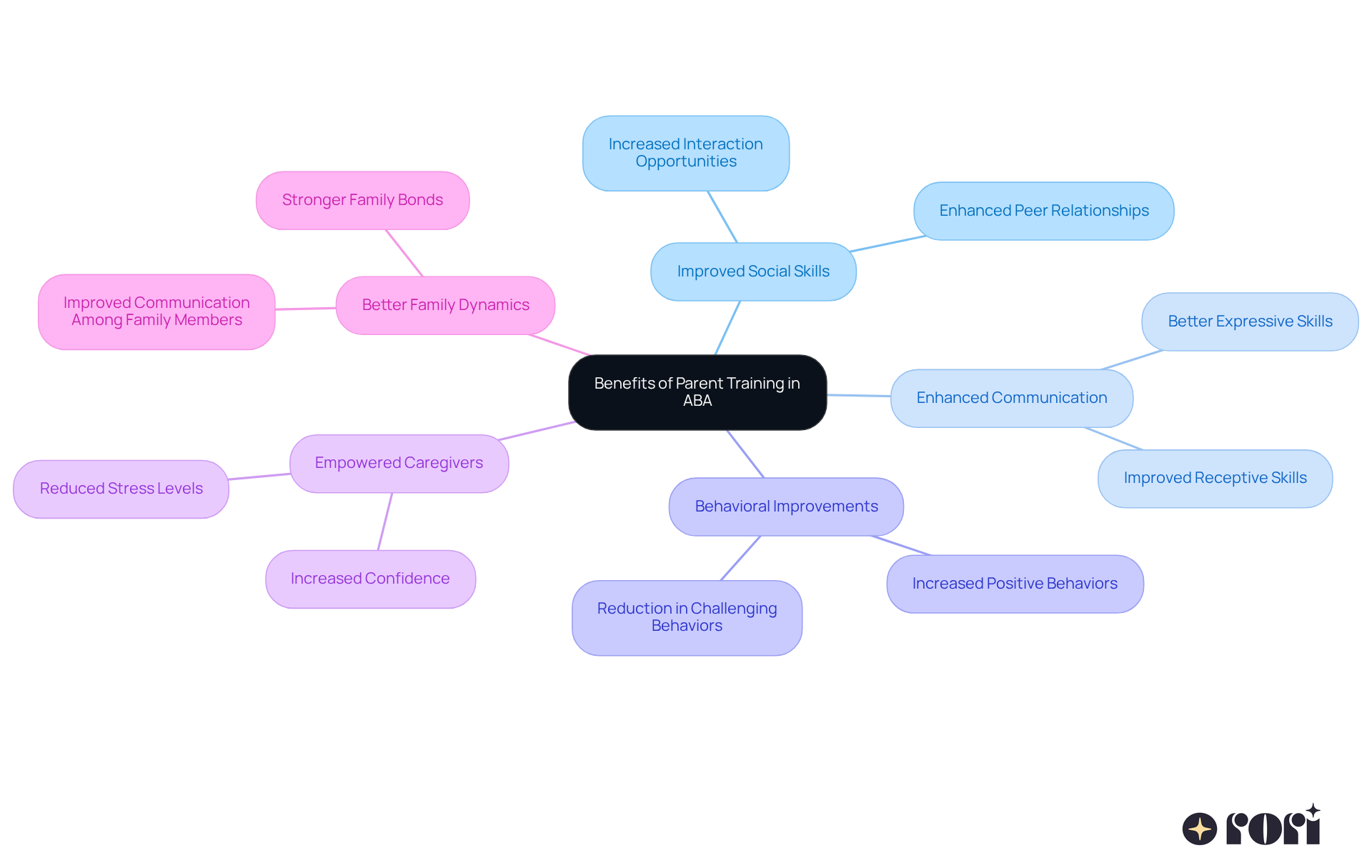
Effective ABA caregiver training programs should incorporate parent training ABA examples along with several key components to ensure success. These components encompass:
It’s important that programs are tailored to meet the specific needs of each family, incorporating their unique challenges and goals. By understanding these vital components, parents can select parent training ABA examples that will best support their journey in applying ABA strategies and promoting their child's development.
At Rori Care - ABA Therapy, we make things even easier by utilizing automatic data gathering during clinical sessions. This means our clinical team is consistently available for your little one without interrupting the process for data entry. We securely keep this information, anonymizing it and removing it after examination, so caregivers can gain valuable insights into their child’s progress. For instance, these insights can help caregivers recognize effective strategies and adapt their methods based on real-time data, ultimately enabling them to support their child's behavioral goals more efficiently. Let’s explore this together!
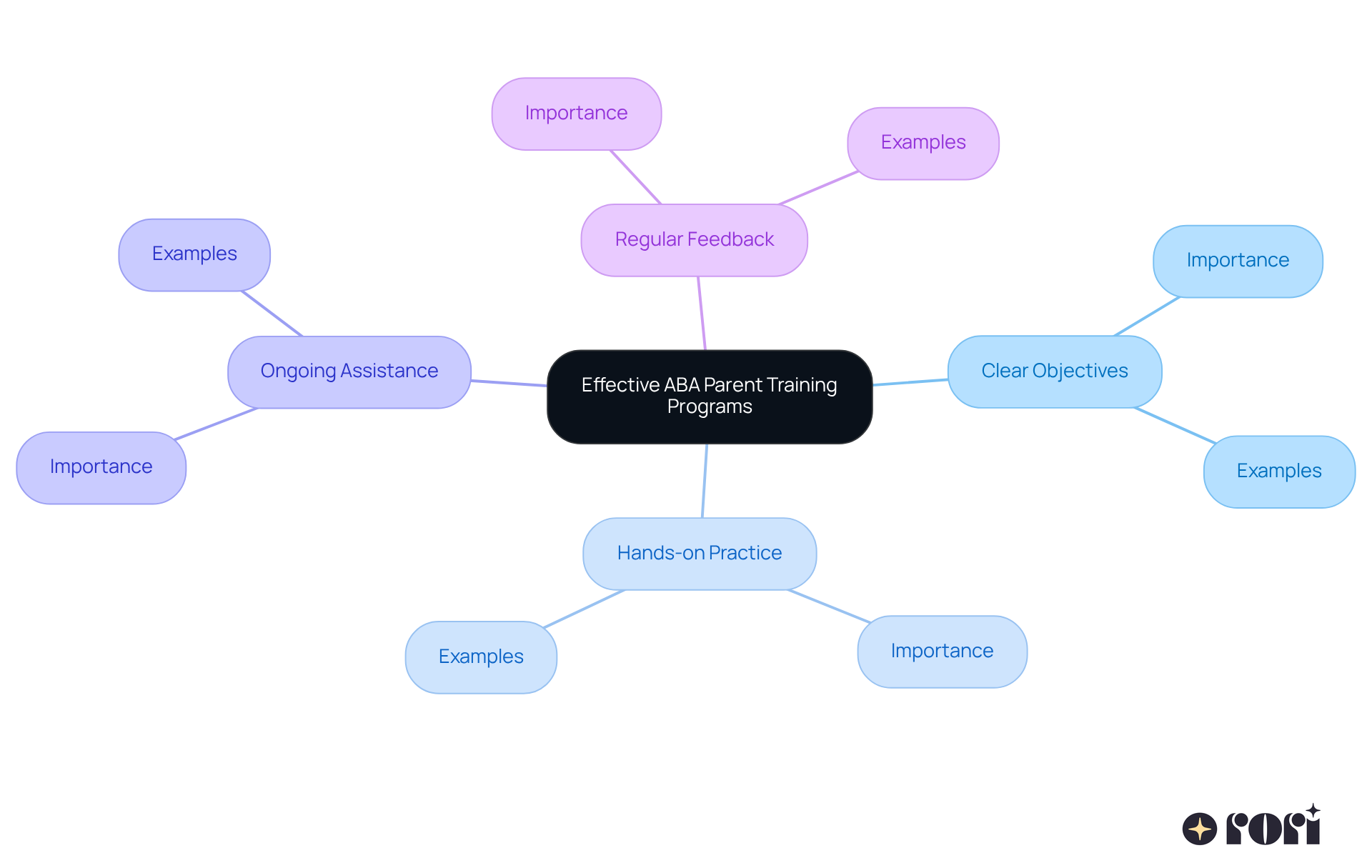
Continuous assistance is crucial for caregivers participating in parent training ABA examples. Resources like workshops, online courses, and support groups can offer valuable insights and encouragement. When caregivers participate in parent training ABA examples, it enhances their ability to provide effective support at home, complementing professional interventions and promoting consistency.
Websites dedicated to autism resources often feature articles, webinars, and forums where caregivers can connect with others facing similar challenges. Plus, seeking advice from experts can help caregivers stay updated on the best methods and recent advancements in ABA therapy.
By utilizing these resources, parents can continue to sharpen their skills through parent training ABA examples, improve behavioral outcomes, and empower themselves to support their child's growth effectively. Let’s explore this together! Remember, you’re not alone on this journey.

Empowering parents through tailored training programs in Applied Behavior Analysis (ABA) is key to fostering positive growth in children. When caregivers actively engage in parent training ABA examples, they become more than mere observers; they become integral participants in their child’s development. This collaborative approach not only boosts the effectiveness of ABA therapy but also leads to significant improvements in behavioral outcomes.
Throughout this article, we’ve highlighted key strategies like positive reinforcement techniques and collaborative efforts between parents and professionals. Integrating ABA strategies into daily routines can make a world of difference. Real-life case studies show the transformative impact of parent-led interventions, illustrating how empowered caregivers can truly facilitate their child's progress. Plus, addressing common challenges in parent training and leveraging technology can enhance the experience, enabling parents to offer consistent and effective support.
Ultimately, the journey of parent training in ABA is all about collaboration, learning, and empowerment. By investing time and effort into understanding and applying ABA principles, caregivers can create a nurturing environment that promotes their child's development. Embracing available resources and support can lead to lasting positive changes, reinforcing that active parental involvement is a cornerstone of successful ABA therapy. Let’s take this as a call to action for all caregivers: engage in your child's growth, and together, let’s foster a brighter future!
What is Rori Care - ABA Therapy?
Rori Care - ABA Therapy provides tailored programs for families navigating Applied Behavior Analysis treatment, focusing on equipping caregivers with the skills and knowledge needed to support their child's unique needs.
How does Rori Care involve parents in the therapy process?
Rori Care actively involves parents through parent training ABA examples, ensuring they are essential participants in their child's development, which enhances the effectiveness of ABA therapy.
What impact does caregiver engagement have on children's behavior?
When caregivers are engaged in the therapy process, about 90% of children show improvement in important behavioral areas.
What kind of plans does Rori Care create for children?
Rori Care prioritizes individualized behavior intervention plans, crafted by qualified analysts, which include parent training ABA examples to promote positive behavior changes and skill acquisition.
Are there insurance coverage options available for these services?
Yes, Rori Care offers insurance coverage options to help families access vital ABA therapy services.
What role do positive reinforcement techniques play in ABA therapy?
Positive reinforcement techniques encourage desired behaviors through rewards and praise, motivating children and strengthening behaviors to increase the likelihood of their recurrence.
How can parents influence their child's growth in ABA therapy?
By actively engaging in parent training ABA examples and creating a positive atmosphere, parents can significantly influence their child's growth and development.
What is the importance of collaboration between parents and professionals in ABA therapy?
A cooperative strategy that includes parent training ABA examples fosters open dialogue and feedback, allowing parents to share insights about their child's behavior, leading to tailored guidance and effective treatment plans.
How does Rori Care ensure data privacy during therapy sessions?
Rori Care uses automatic data collection during sessions, keeping track of progress without interrupting therapy. The data is securely stored, anonymized, and deleted after analysis.
How can parents engage with the data collected during therapy?
Parents are encouraged to actively discuss the data collected and how it shapes treatment strategies, which supports informed decision-making regarding their child's development.